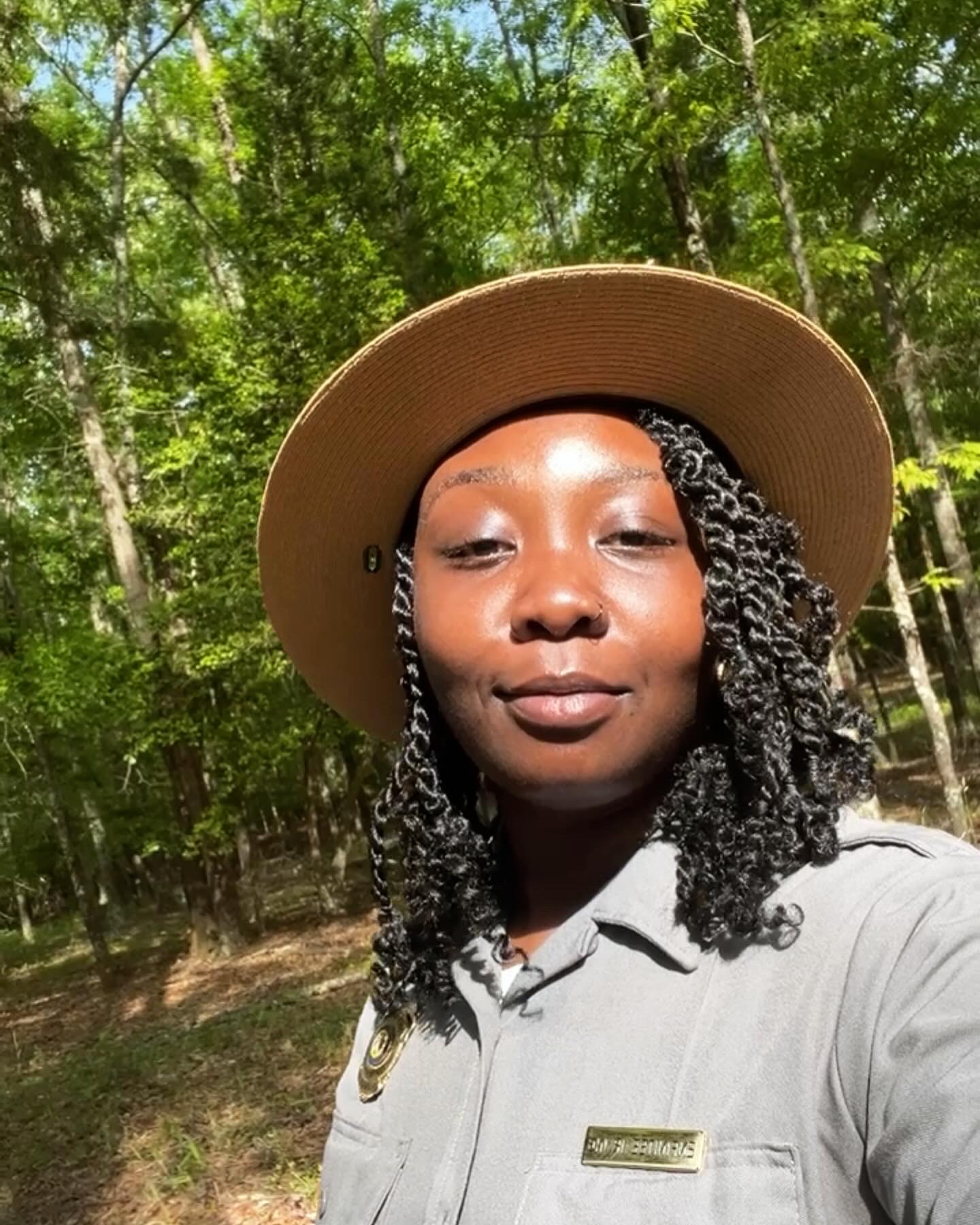By: Enfinitee R. Irving
May 15, 2024
Hello! My name is Enfinitee Irving. I am a graduate of South Carolina State University. I hold a bachelor’s degree in Professional History and am a Certified Interpretive Guide through the National Association of Interpretation. I’ve participated in numerous published historical projects funded by grants from the South Carolina Department of Archives and History, in collaboration with the African American Heritage Commission. My love for history developed as a child, growing up in the small town of Cameron, South Carolina. I listened to many stories about the past from the elders in my community, and it made me fall in love with history. My imagination allowed me to visualize the past, as well as my strong memory allows me the ability to hold on to these stories and facts.
My career as a ranger began at Rose Hill Plantation State Historic Site, where I was the first historical interpretive intern. After completing a 10-week internship at Rose Hill, I moved to the central office for almost a year. During this time, I continued to work at Rose hill; I also worked with the staff at Hampton Plantation State Historic Site, conducting tours once a week. I created a video documenting the pre-park history of Sesquicentennial State Park and a video series titled “South Carolina State Park Journey Towards Integration,” which featured Edisto Beach State Park, Poinsette State Park, and Sesquicentennial. Additionally, I participated in an archaeology field school at Sesquicentennial, gaining hands-on experience. I completed a wayside for Chester State Park, that discussed the CCC Company that built the park, and searched for graves at parks like Santee State Park.
Currently, I am the park interpreter at Rose Hill Plantation State Historic Site. As a Black woman working in the history field, I often find myself in a unique position, as there are not many others who look like me doing this work. This lack of representation may be due to the fact that many Black people are not fully aware of the career opportunities available in the field of historical preservation. My responsibilities include educating the public, conducting research, preserving antiques, and engaging in community outreach. My programs here at Rose Hill are educational and impactful. I never imagined my career would lead me to work on a plantation, interpreting the complex and often painful history of slavery, reconstruction, and other racially charged topics. While this path is challenging and not one everyone can walk, I am honored to be a voice for the many enslaved ancestors who once lived and worked on this land.
In my role, I conduct house tours, create engaging programs and events, and continuously research to expand our understanding of the site’s history. I am also gradually learning more about historic preservation, which is crucial for maintaining the integrity of these old buildings and structures. One observation I’ve made since working at a plantation is that Black visitors rarely come to these sites. Plantations are filled with a heavy trauma, making it difficult for many Black people to feel comfortable visiting, despite our efforts to show them that they are welcome and that our programs are geared towards their inclusion. Understanding plantation history is essential to gaining a deeper understanding of American history as a whole. There is no American history without first acknowledging the institution of slavery.
Today we have many groups who aim to minimize or forget the impact that slavery had on the foundation of the country and the world. It is important for all Americans to recognize that many industries and institutions still operating today were built on the backs of enslaved labor. Acknowledging this fact is crucial to preventing future generations from forgetting this history, which would further silence and erase the experiences of those who lived through it.
Increasing diversity in both the historic preservation and public history field can profoundly impact the profession. By encouraging more black people to enter this field, we can ensure a more inclusive and comprehensive interpretation of history. Diverse perspectives bring a richer understanding of the past, allowing us to tell stories that might otherwise be overlooked or underrepresented. This inclusivity can help make historic sites more welcoming and relevant to a broader audience, fostering greater public engagement and support for preservation efforts. This will also lead to newer innovative approaches to conservation and interpretation, drawing on a wide range of cultural experiences and knowledge. This can enhance the preservation of sites significant to various communities, ensuring that a more accurate and complete history is maintained for future generations.
My role at Rose Hill Plantation State Historic Site is not only about preserving the past but also about shaping the future of historic preservation and public history. By holding this position, I am paving the way for future generations to ensure that all stories are told and remembered. I aspire to see more Black people in roles like mine, sharing our stories with integrity and truth. Together, we can continue to honor and liberate our collective ancestors.

